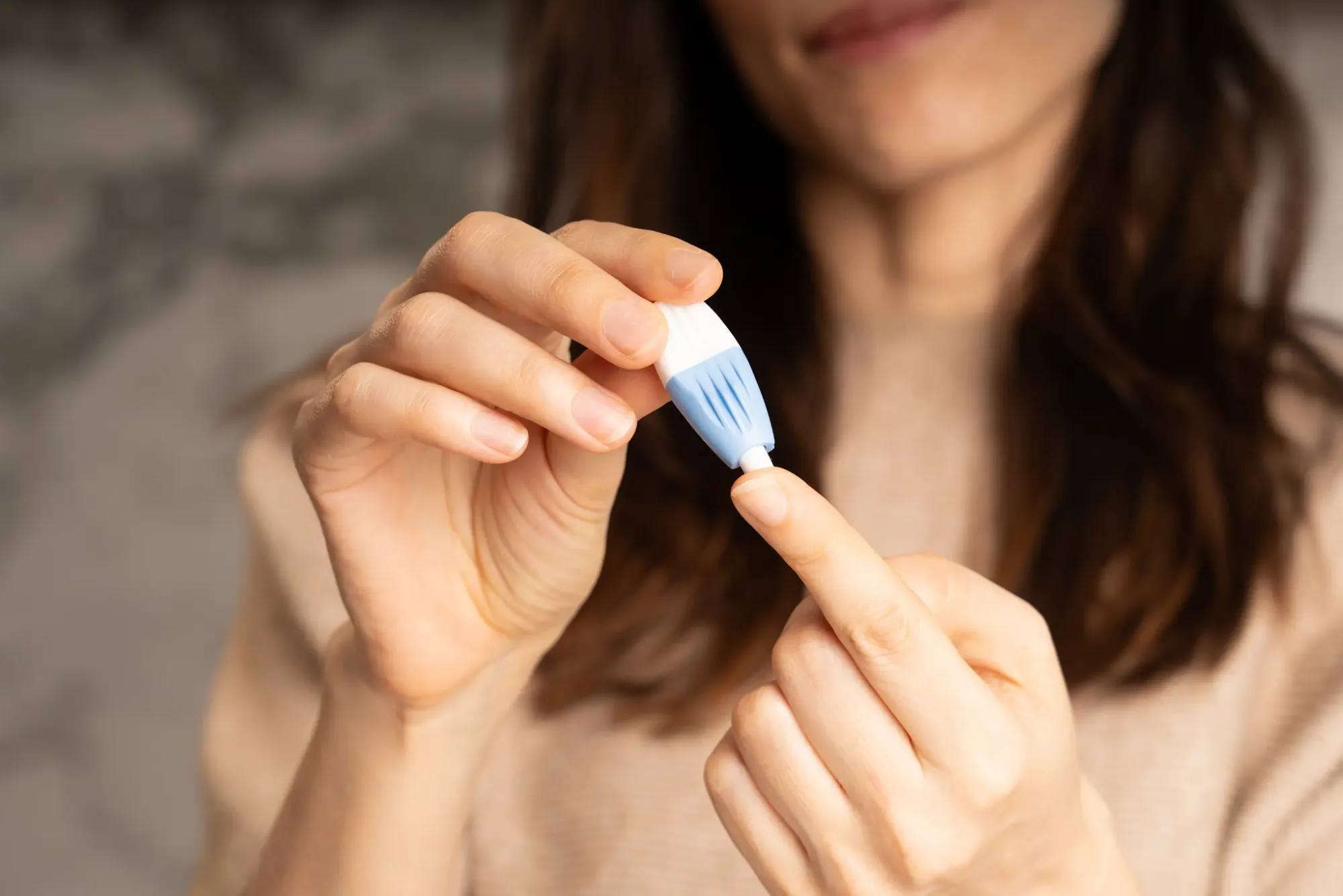As women in the UAE and Saudi Arabia increasingly prioritize their health and career goals, understanding hormonal health has become more crucial than ever. With fertility rates declining across the region and women marrying later in life, knowing when and why to get hormone testing can be the key to making informed decisions about your reproductive future and overall wellbeing.
In this comprehensive guide, we’ll explore the critical signs that indicate you need hormone testing, why it’s essential for women’s health, and how innovative solutions like Ovasave are making hormone testing more accessible than ever for women across the Emirates and Kingdom of Saudi Arabia.
The Hidden Health Crisis: Why Hormone Testing Matters More Than You Think
Hormonal imbalances are far more common than most women realize, yet they often go undiagnosed for years. Research shows that in the Middle East and North Africa region, polycystic ovary syndrome (PCOS) affects up to 16% of women – nearly triple the rate seen in other populations. In the UAE specifically, studies indicate that one in six couples face fertility challenges, while 36.38% of women attending fertility clinics show signs of diminished ovarian reserve.
These statistics aren’t just numbers – they represent real women whose lives could be dramatically improved through early hormone testing and intervention. The problem is that many women don’t recognize the subtle signs their hormones are trying to communicate, or they dismiss symptoms as “normal” parts of being female.
The Critical Signs: When Your Body is Asking for Hormone Testing
1. Irregular or Absent Menstrual Cycles
Your menstrual cycle is like a monthly report card for your hormonal health. If you’re experiencing any of the following, it’s time to consider comprehensive hormone testing:
- Cycles shorter than 21 days or longer than 35 days
- Missing periods for three months or more (when not pregnant)
- Bleeding between periods
- Periods that last longer than seven days
- Sudden changes in your typically regular cycle
These irregularities can indicate imbalances in key hormones like FSH (Follicle-Stimulating Hormone), LH (Luteinizing Hormone), or estradiol, all of which are included in Ovasave’s comprehensive seven-hormone panel.
2. Fertility Challenges and Family Planning Concerns
In the UAE and Saudi Arabia, where the median age at marriage has increased to 26.1 and 29.1 years respectively for women and men, many couples find themselves facing fertility challenges they didn’t anticipate. If you’ve been trying to conceive for more than six months (if you’re over 35) or twelve months (if you’re under 35), hormone testing becomes essential.
Key fertility-related symptoms that warrant testing include:
- Difficulty getting pregnant despite regular unprotected intercourse
- Recurrent miscarriages
- Concerns about egg quality or ovarian reserve
- Planning for egg freezing or fertility preservation
Ovasave’s Anti-Müllerian Hormone (AMH) testing is particularly crucial here, as it provides insight into your ovarian reserve – essentially, how many eggs you have left. In the UAE, research shows that AMH levels have been declining over recent years, making early assessment more important than ever.
3. Unexplained Weight Changes and Metabolic Issues
Sudden weight gain or loss, especially around the midsection, can signal hormonal imbalances. This is particularly relevant in the Gulf region, where lifestyle factors and genetic predisposition create higher risks for hormonal disorders like PCOS.
Watch for these metabolic red flags:
- Unexplained weight gain despite unchanged diet and exercise
- Difficulty losing weight even with significant lifestyle changes
- Increased cravings for sugary or high-carb foods
- Fatigue that doesn’t improve with rest
- Changes in appetite or eating patterns
Thyroid hormones (TSH and FT4), both included in Ovasave’s panel, are often the culprits behind these metabolic disruptions.
4. Mood and Sleep Disruptions
Hormones profoundly impact your mental health and sleep quality. Research in Saudi Arabia shows concerning rates of depression among women, particularly those using hormonal contraceptives. If you’re experiencing any of these symptoms, hormone testing could provide crucial answers:
- Severe mood swings that seem disproportionate to life events
- Persistent anxiety or depression, especially if it coincides with your menstrual cycle
- Difficulty falling asleep or staying asleep
- Night sweats or hot flashes (even if you’re not near menopause)
- Brain fog or difficulty concentrating
5. Physical Changes That Signal Hormonal Shifts
Your body often provides visible clues about hormonal imbalances:
Hair and Skin Changes:
- Thinning hair or male-pattern hair loss
- Excessive hair growth on face, chest, or back (hirsutism)
- Adult acne, especially along the jawline
- Dry skin or unusual skin pigmentation
Sexual and Reproductive Health:
- Decreased libido or sexual dysfunction
- Vaginal dryness or painful intercourse
- Breast tenderness unrelated to menstrual cycle
- Unexplained pelvic pain
Age-Specific Hormone Testing: When Timing Matters Most
Women in Their 20s and Early 30s
Even if you’re not planning to have children immediately, baseline hormone testing can provide valuable insights for future planning. This is especially important for women with family histories of PCOS, thyroid disorders, or early menopause.
Women in Their Mid-30s and Beyond
As fertility naturally declines with age, hormone testing becomes increasingly important. In the UAE, where many women are focusing on career development and marrying later, understanding your hormonal status can inform crucial decisions about family planning and reproductive health.
Perimenopausal Women
Women experiencing early menopause symptoms need comprehensive hormone evaluation. Research in Saudi Arabia shows that many women experience menopause between ages 45-60, but symptoms can begin much earlier.
The Ovasave Advantage: Comprehensive Hormone Testing Made Simple

Traditional hormone testing in the UAE and Saudi Arabia can be expensive, time-consuming, and stressful. Clinic visits often cost 2,500 AED or more, require multiple appointments, and leave women feeling rushed through the process. This is where Ovasave’s innovative approach becomes a game-changer.
The Seven-Hormone Comprehensive Panel
Ovasave tests seven critical hormones that provide a complete picture of your reproductive and overall health:
- Anti-Müllerian Hormone (AMH) – Indicates ovarian reserve and fertility potential
- Follicle-Stimulating Hormone (FSH) – Shows how hard your body is working to stimulate egg production
- Luteinizing Hormone (LH) – Critical for ovulation and can indicate PCOS when elevated
- Thyroid-Stimulating Hormone (TSH) – Essential for metabolism, energy, and fertility
- Free Thyroxine (FT4) – The active thyroid hormone affecting every body system
- Estradiol (E2) – The primary estrogen hormone affecting fertility and overall health
- Prolactin – Important for breast health and can affect fertility when elevated
This comprehensive approach means you get a complete hormonal assessment in one simple test, rather than multiple clinic visits and separate blood draws.
Why At-Home Testing Makes Sense for Modern Women
For women in the UAE and Saudi Arabia, Ovasave’s at-home testing offers several crucial advantages:
Privacy and Comfort: In our culturally sensitive region, the ability to collect samples privately at home eliminates potential social concerns about visiting fertility clinics.
Cost-Effectiveness: At more than 50% less than traditional clinic testing, Ovasave makes comprehensive hormone testing accessible to more women.
Convenience: No appointment scheduling, no time off work, no parking hassles – just simple, straightforward testing when it works for your schedule.
Speed and Transparency: Results available in just 48 hours through a secure online dashboard, with clear explanations and access to expert consultation.
Understanding Your Results: What Your Hormones Are Telling You
Normal vs. Concerning Levels
Understanding what your hormone results mean is crucial for making informed health decisions. Here’s what to look for:
AMH Levels:
- Normal: 0.7-3.5 ng/ml
- Low (<1.3 ng/ml): May indicate diminished ovarian reserve
- High (>3.5 ng/ml): Could suggest PCOS
FSH Levels:
- Normal: 3-9 mIU/ml on day 3 of cycle
- Elevated: May indicate reduced ovarian function
Thyroid Markers (TSH/FT4):
- TSH: 0.2-4.7 mIU/ml (ideally <2.5 for fertility)
- FT4: Within laboratory reference range
Red Flags That Require Immediate Attention
Certain hormone level combinations require prompt medical consultation:
- Very low AMH with high FSH (suggesting ovarian failure)
- High prolactin levels (could indicate pituitary issues)
- Significantly elevated or suppressed thyroid hormones
- Multiple hormonal imbalances suggesting complex conditions like PCOS
The Regional Context: Why Hormone Testing is Especially Important in the UAE and Saudi Arabia
Unique Risk Factors in the Gulf Region
Women in the UAE and Saudi Arabia face specific challenges that make hormone testing particularly important:
Lifestyle Factors:
- High-stress professional environments
- Limited sun exposure affecting vitamin D status
- Dietary patterns high in processed foods
- Sedentary lifestyles in air-conditioned environments
Genetic Predisposition:
- Higher rates of PCOS in Middle Eastern populations (11.9% vs 6-8% globally)
- Increased risk of thyroid disorders
- Genetic factors affecting fertility
Cultural and Social Factors:
- Later marriage and childbearing ages
- Career-focused lifestyles delaying family planning
- Limited reproductive health education
The Economic Impact
The growing fertility treatment market in the MENA region, valued at approximately $10 billion, reflects the increasing need for reproductive health services. However, prevention through early hormone testing could significantly reduce the need for expensive fertility treatments later.
Taking Action: Your Hormone Health Roadmap
Step 1: Recognize the Signs
Review the symptoms and risk factors outlined above. If you identify with multiple indicators, it’s time to consider testing.
Step 2: Choose the Right Testing Approach
For most women, Ovasave’s comprehensive seven-hormone panel provides the ideal starting point – it’s thorough, convenient, and cost-effective.
Step 3: Understand Your Results
Work with healthcare professionals to interpret your results and develop an appropriate action plan.
Step 4: Take Proactive Steps
Whether your results show normal levels (great for peace of mind!) or reveal imbalances that need attention, early knowledge empowers better health decisions.
The Future of Women’s Health in the Region
As the UAE and Saudi Arabia continue to advance healthcare innovation and women’s empowerment, accessible hormone testing represents a crucial step forward. By making comprehensive hormone assessment available through platforms like Ovasave, women can take control of their reproductive health before problems develop, rather than after they’ve already impacted their lives and fertility.
The statistics are clear: hormonal imbalances and fertility challenges are common in our region. But with the right information and timely intervention, most women can optimize their hormonal health and make informed decisions about their reproductive futures.
Conclusion: Your Health, Your Choice, Your Timeline
How Ovasave is Making Fertility Care More Accessible
Hormone testing isn’t just about fertility – it’s about understanding your body, optimizing your health, and making informed decisions about your future. Whether you’re 25 and curious about your baseline health, 35 and planning to start a family, or 45 and experiencing perimenopausal symptoms, knowledge is power.
The signs your body gives you – irregular cycles, unexplained weight changes, mood disruptions, or fertility concerns – are not something to ignore or dismiss as “normal.” They’re your body’s way of asking for attention and care.
With innovative solutions like Ovasave making comprehensive hormone testing accessible, affordable, and convenient for women across the UAE and Saudi Arabia, there’s never been a better time to take charge of your hormonal health. Don’t wait until you’re facing fertility challenges or serious health issues. The information you need is just a simple test away.
Your hormones are the conductors of your body’s orchestra – make sure they’re playing in harmony. Your future self will thank you for taking action today.












